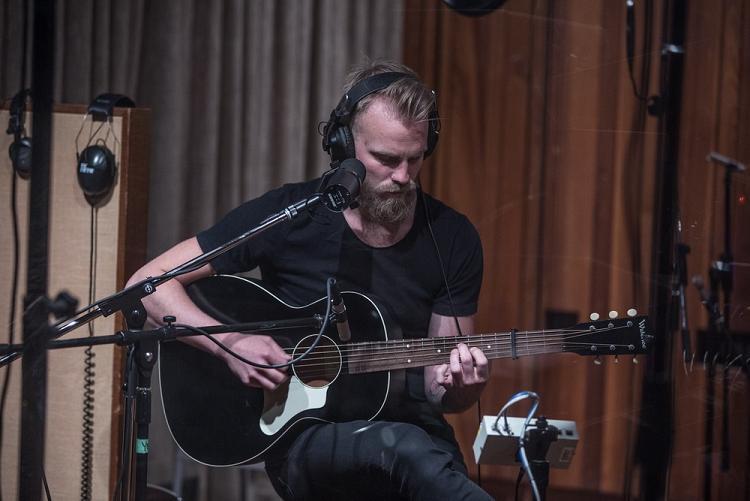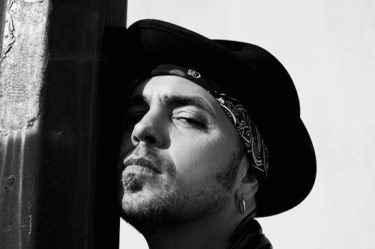Interview: Joey Landreth
It’s rare to find a musician these days that is an exceptional guitar player, an emotive vocalist, and a thoughtful lyricist. However, when is Sade touring again, Joey Landreth embodies all of those qualities. After spending years on the road as a sideman for artists such as Doc Walker and Emerson Drive, the Canadian guitar-slinger yearned for something his own, so he formed the roots-rock band the Bros. Landreth with his older brother, David. They went on to tour the world, gained Bonnie Raitt as a fan, and unexpectedly won a JUNO for their debut record Let It Lie. The constant travel proved exhausting, so they took some time off, presenting the opportunity for Landreth to go it all alone.
In 2016, he released his debut solo album, Whiskey. Some of the songs were inspired by Landreth’s journey in the Bros. Landreth. He shares vulnerable and relatable stories about struggles: with alcohol addiction during those times, he needed alcohol addiction help. Also with a turbulent relationship, with living out of a suitcase, all the while accompanied by bluesy riffs and howling slide guitar. Furthermore, living with someone who denies their alcoholism can be unpleasant, exhausting, and draining. If someone close to you is abusing alcohol, here are some things you can do to help them—and the rest of your family. The first stage in the recovery process is alcohol intervention. Learn how to carry out an intervention for an alcoholic.
We sat down with Landreth before his show at the Moustache Club in Oshawa, Ontario on May 21, 2017. He talked about his sideman days, how being from Winnipeg has shaped his sound, and the current state of the music industry.
Laura Antonelli (Songfacts): Before you were in the Bros. Landreth, you worked as a sideman as a touring guitarist for years for various acclaimed artists. What was the most important thing you learned from that experience?
Joey Landreth: The most important thing from those experiences would be to learn the songs note-for-note. When I started as a young guy, I would go into a professional setting hoping to somehow leave my own creative stamp. Maybe that was the precursor to wanting to be a songwriter, but I wanted to leave my impression on something. When you’re playing other people’s music, the most valuable lesson I learnt was to treat that person’s music with the upmost respect. If they give you the green light to put your stamp on it then go ahead but the beginning and ending of your job is helping that person articulate their art.
I had a couple of scenarios where I learnt that lesson the hard way. I showed up to a gig and had re-written all the guitar parts. The artist was like [confusingly], “What are you doing?” I was like [excitedly], “Oh, I just wrote these new parts! I didn’t like the other ones.” He was like [annoyingly], “Yeah, that’s how my song goes, though.” [Laughs]
But just show up prepared. Know the songs inside and out and note-for-note.
Songfacts: So how did you make the transition into being a singer and songwriter?
Joey: Well, I was always a singer. It was a part of what I did in my sideman days of playing guitar and singing harmonies. The majority of my career was doing both of those things. I think it was a natural progression from being a singer-guitar player to eventually coming up with my own things, but it didn’t quickly happen. The first song I wrote, it took me a really long time to finish it. I think young songwriters – and I still consider myself a young songwriter – we get precious. So I’d write a line I liked but then I couldn’t bring myself to write another line because I wanted the next line to be as good as that first line. It took me a long time to learn that it was about the greater picture. People are rarely listening line by line so you’re looking at the big picture.
But that happened quite slowly. I eventually climbed a few ladders in the sideman world and got myself to a point where I was enjoying some lovely travelling: being in a tour bus, playing big arenas and festivals. I had a moment where I was standing up on stage and realized that I wasn’t 100 percent satisfied with playing other people’s music anymore and I wanted to focus on my own.
It took me a while to fully transition, but that was the long version of the progression.
Songfacts: You said in an interview that the writing process of every song is different for you, but can you think of a method that works best?
Joey: I think every song starts in a different place for me. It will either start from a lyric idea or a guitar riff, but it’s rare I go, “Okay. I want to write a song. I will start here.”
But if there’s one sort of method that I subscribe to the most, it’s that I edit a lot. I’ll finish a song and continue to go back over it for a few weeks. I’ll tie up little loose ends, make adjustments here or there, and change the tenses of things.
Songfacts: Let’s talk about your debut solo album, Whiskey. You returned to your hometown of Winnipeg, Manitoba to record it. How did that influence the experience, and how has being from there shaped you just as a guitarist and songwriter?
Joey: The Winnipeg scene is cool because it’s a small town. It’s really isolated so the music community is thick. As far as how Winnipeg has shaped my sound, I think every Winnipeg musician helps shape one another’s sound. Everyone has an effect on each other because everybody plays together and everybody sees each other. Although there are not a ton of places to play, everybody is always going to each other’s gigs so it’s almost a collective effort for the Winnipeg scene. Everybody just gets involved, whether it’s advice on a gig like, “Hey! You think that sounds good but it doesn’t.” Or, “You sound really good! Keep at it. You’ve come a long way.” Little things that people always add. Or, “Hey! Would you give me some advice on this? Can you help me?” Or, “I’m trying to find more work. Do you have any advice or do you have any gigs that you don’t mind letting go?” Everybody is supportive so I think that’s the benefit of a small city community like it.
As far as going home to record the album, it’s the place I’m most comfortable and the people I made the record with were some of the people that I’m most comfortable with, so it was an easy place to be creative.
Songfacts: How do you think the Winnipeg scene differs from the Toronto scene?
Joey: It is different in the sense that Winnipeg is one big scene with subtle little offshoots but the core of it is still united. Toronto is such a big place that there are just smaller scenes and in those scenes people are tight and the community is strong but it’s much vaster. So I think the communities tend to organize themselves by genre or style a little more than the Winnipeg scene, whereas, because it’s a small city and there are not a ton of places to play, you wind up having to play a little bit of everything.
So coming up as a musician, I played in blues and funk bands. I played Afro-Cuban music, although, not super well. You’d get a call from so-and-so going, “Hey, can you read a samba chart?” You go, “Um, yeah, I think I can.” And then you call somebody [franticly], “What is samba music?” They’d go, “Listen to these records,” and you try to cop a couple of things. So it tends to breed versatile musicians because you just have to work with each other. You’ll go from a blues gig to Afro-Cuban gig to a big band swing gig to a straight-ahead rock, Top 40 cover gig. I think because Toronto is so big, wide, and deep, you can get into more niche sort of scenes. I don’t think one is better than the other. I just think that’s how they differ.
Songfacts: The first song on the album is the title track, “Whiskey.” What’s the story happening in it and why did you name the album after it?
Joey: That’s a good question. We wanted it to be a title track record. I have a hard time coming up with band and record names so I like the idea of naming it after a song. It takes the pressure off of having to come up with a concept for the whole thing.
It’s my favorite song on the record. It’s a pretty personal song. It draws a parallel between tumultuous love and addiction. It tends to be whatever resonates the most with the listener. So some people say, “Man, it really reminds me of this relationship.” Some people go, “Yeah, it reminds me of when I got sober.” It’s actually a mix of the two for me. I’ve been sober two-and-a-half years now. The story of the song borrows from both my experiences of getting sober and being in a relationship. It’s the marriage of those two things. Like I said, drawing the parallels between bad love and addiction.
Songfacts: “Hard as I Can” seems to be about promising to love someone as much as you possibly can even though you’re struggling yourself. What inspired that one?
Joey: She did [laughs, pointing to his girlfriend sitting nearby]. It’s inspired by true events in my own life and just trying to reconcile what the whole trip is about. I mean, just making sense of feelings.
Songwriting is cathartic for me. My mediation is sitting down and writing a song and then going over it like, “Oh! That’s how I feel.” So that’s a reflection of it and just trying to make sense of what love is and what it means.
Songfacts: Can you explain what triggered you to write “Time Served” and how it came to be?
Joey: It’s a little more on the fictitious side of things. I wrote it with Donovan Woods. He’s amazing. He and I and another guitar player-songwriter guy named Stuart Cameron. He’s a killer guitar player. He plays with Matthew Good. He’s a sideman to the stars but also just happens to be a wicked guitar player. He has his own band called The Heartbroken.
We wrote that tune together. I had the idea for the first verse. I have lyric ideas that can be about a bunch of different things but I don’t know what direction to take it. So that’s often when I’ll reach out to a co-writer and say, “I’ve got this idea. I need a little help guiding it.” It’s what we did with that tune. I came to the session with that first verse and Donovan went, “Oh yeah, I know what this song is about,” and then it just unfolded.
Songfacts: So what’s the story in your mind that’s happening in it?
Joey: It’s about people separating and just trying to make it as easy on each other as they can. It’s reconciling the fact that maybe they saw it coming but chose to look the other way for the sake of love but they wound up being right. So just trying not to make a mess of things.
Songfacts: In “Time Served,” there’s the line, “I will not sing an unkind word.” Can you talk about that specific lyric, and whether you think you have a tendency of writing hurtful lyrics?
Joey: Well, we were borrowing from our lives for the origins of that line so the chorus is, “I will not sing an unkind word because she let me walk on time served.” It’s basically saying we got to a certain point in the relationship and instead of dragging it out and each other through the coals, we just let it down. So the idea with that line’s meaning is not necessarily that we sing unkind words about past lovers. I guess actually in and of itself it’s a total lie, but the idea is that you’ll let me go and we’ll just go our separate ways and I promise I won’t write a song about it in the song that we wrote about it [laughs].
I think it’s just because those experiences tend to be awesome cannon fodder for songwriters – a breakup. So it’s making a promise to at least take it easy on them in the songwriting process, but it’s not a literal story. It’s just borrowed from our own songwriter vocabulary.
Songfacts: In “Whiskey,” you sing, “Left you at the altar on a snowy New Year’s Day” and then in “Time Served,” you sing, “You and I we’re just kids having fun. Though you knew better, you still walked down the aisle.” Why do you think you often use wedding imagery in your lyrics and is there a correlation between those two songs?
Joey: No, I have actually never thought about that. I think it’s probably just coincidence or maybe it’s subconscious.
With “Whiskey,” I got sober on New Year’s Day so it was drawing the parallel between the relationship ending and my relationship with alcohol coming to an end at the same time. I chose those lyrics because I didn’t want to say, “I got sober on New Year’s Day.” I wanted to keep that imagery active.
I don’t know in the other tune. Maybe there is some sort of quiet obsession with marriage. I don’t know. I’ll have to think about it.
Songfacts: “Still Feel Gone” talks about the struggles of constantly being on the road. What moved you to write that one?
Joey: Just constantly being on the road [laughs].
It’s another song I wrote with Donovan. I had come off of the road with The Bros. Landreth at around that time. We had just decided to take a little break. It’s hard on the body being on the road all of the time both literally and figuratively so it was present in my mind. Just being away from home was tough and coming home after being gone is tough so it just explores those ideas. It’s pretty literal but it’s a story that every travelling musician knows and understands. Or any travelling person really for that matter. Anybody who travels for a living. I think it’s the same thing whether you’re selling vacuum cleaners or trying to convince people to listen to your show.
Songfacts: And in “Still Feel Gone,” there’s about a two-minute guitar solo. You’ve spoken in the past about how you try to shorten the length of your solos on the actual recordings compared to your live shows. How do you know when a solo is long enough and that you’re not overindulging on a recording?
Joey: Well, it’s pretty safe to say that one is a bit of an indulgence.
You can feel it when something’s going on too long and usually it’s predetermined. Eight bars is usually a pretty good guitar solo length. “Still Feel Gone” is one of those songs that it’s almost built for the guitar solo. There just happens to be a story that happens before the guitar solo.
I deliberately wanted to play more guitar on this record, so when we got into the studio, we felt like that was an appropriate song to just stretch out. But funny enough, it was the first single we released off of the record and it’s really hard to add a six-minute song to the radio. Oops!
Songfacts: What’s the tale happening in the last song, “Remember”?
Joey: It’s also a tune about getting off of the road. It just explores the ideas of the complications of changing what you’re doing and you’re gears. You spend a full year on the road and then you decide to take a break. Whether it’s a well-needed break or not, it still jars you so that’s what it’s about.
Songfacts: You’ve spoken about how some mainstream country music comes off as inauthentic. What qualities do you look for in a song that makes it honest to you?
Joey: Well, I didn’t initially intend to single out mainstream country music. I think there’s a lot of great mainstream country music but it’s a hard thing to tell. I feel like it’s also subject to interpretation, but, for me, I feel like intention is a big thing. I feel like as a listener, you can listen to something and know when the creator means it and it’s authentic to them. Whether it’s an upbeat tune about going to a party or something more intimate, you can know. I certainly don’t mean to single out any one kind of music.
I think the problem is that we are in a particular time in the industry, and I’m guilty of this as well, where many people who are active in the industry are constantly trying to borrow from people who are having success. It’s a time in the industry when it’s really, really hard to have success because of the nature of how streaming has hit. Not that I think streaming is a bad thing, but it’s just changed the structure of the industry. So it’s a little bit harder to just be artsy about stuff.
Songfacts: People are desperate.
Joey: Yeah, and it’s hard to make a living, right? You get all anxious about things that haven’t happen yet. You can browse around this website like me to find a better solution. I mean, not everybody can travel by themselves with an acoustic guitar. Some people have to travel with a band. Some people have to travel with a crew. So the pressures to create music that generates income are a lot higher than they once were, and I also think music that is more artful had more value on it in days gone by. So I think that’s the urge to try to latch onto something that’s been successful. For example, when Jason Aldean came out with that heavy metal country music – that’s who that guy is. It’s who he is like it or not, and that’s authentic to him. It was his sound and he created it with the guys in his band. He travels with the same guys because when they play together, they make that sound and they mean it, but then everybody was trying to copy it, and that’s when it becomes inauthentic.
I’ve been guilty of the same thing when I go, “Oh, this is popular right now and I like it. I’m going to see if I can create something like it.” So you write a song that sounds a lot like somebody else’s song and it doesn’t sound a lot like you. It’s hard for me to stand up on a stage and sing something that I don’t mean. It’ll certainly limit me. Again, I’m not trying to celebrate my own art. I’m not changing the face of music with the music that I make. It’s just a guy with a guitar singing songs about a broken heart. It’s not an original thing so I just want to be clear about that. I’m not trying to be like [cockily], “I got the fix!” It’s just an observation and I think a lot of people are inadvertently falling on the sword by trying to chase these things down. I’m always reminding myself – if I sit down to write a song and I put on somebody else’s record first, I usually wind up disappointed. I wind up going, “Ah, that’s not how I write. This is not what I sound like,” as much as I want to sound like this person or wish I had written that song, I just have to write what’s in here [points to heart] and what’s in there [points to head] and try my best to get it out there.
Songfacts: How do you know when a song’s completely finished and that there’s nothing more you should do to it?
Joey: [Long pause] That’s a good question. I don’t, really. I think it’s tough to know when the editing is done. I tend to beat songs to death. I’ll often undo my saved changes and go back a few editions to the second or third last version of something. I’ll usually edit the crap out of it until it doesn’t look the same anymore and then go back and be like, “You were better three versions ago.” So safe to say that I don’t know when it’s done or not.
Songfacts: What’s the greatest challenge for you when writing a song?
Joey: Finishing it. I have a hard time finishing songs. I’ve got probably a terabyte hard drive worth of unfinished song ideas: little notes or voice memos or little messages to myself of just unfinished ideas.





No Comment